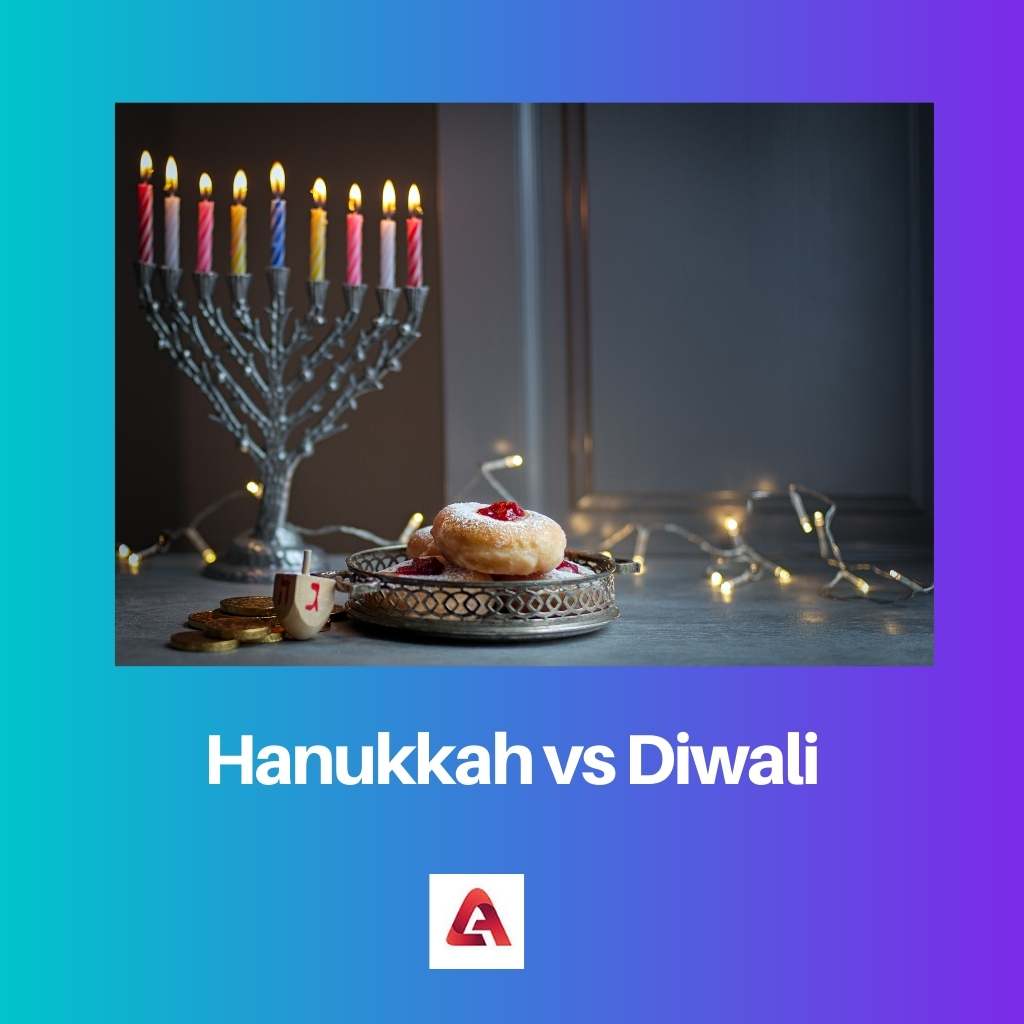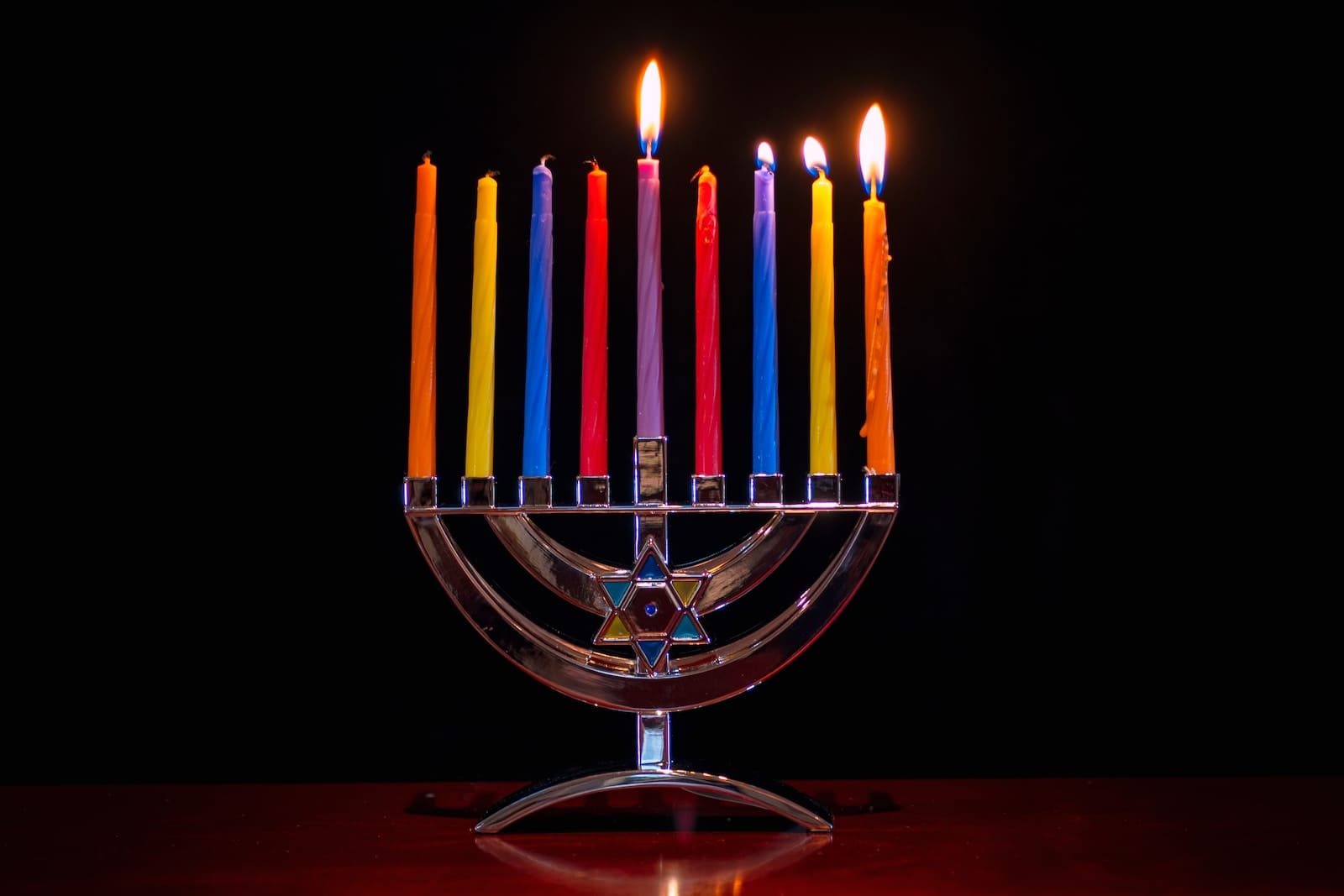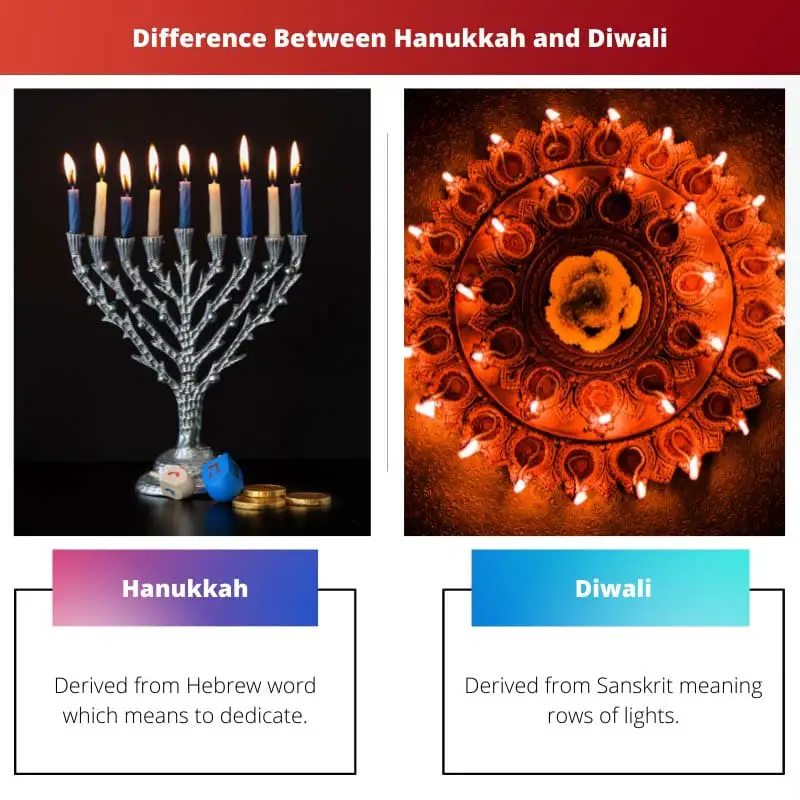Festival seasons will always be everyone’s favorite holidays as it involves spreading joy and happiness to our family and acquaintances.
Looking at the most important festivals, which are Diwali and Hanukkah(known as the festival of lights), both share many common features and differences.
Key Takeaways
- Hanukkah is an eight-day Jewish festival, while Diwali is a five-day Hindu festival.
- Both festivals celebrate the triumph of light over darkness and good over evil but have different origins and rituals.
- Hanukkah commemorates the rededication of the Second Temple in Jerusalem, while Diwali celebrates the return of Lord Rama after defeating Ravana.
Hanukkah vs Diwali
Hanukkah is a Jewish festival that commemorates the rededication of the Temple in Jerusalem after its desecration by the Greeks in 165 BCE. Diwali is a Hindu festival of lights that signifies the victory of light over darkness and good over evil and is important in Hinduism, Jainism, and Sikhism.

The meaning of Hanukkah is “to dedicate” and celebrated by Jews as a rededication of the Second Temple of Jerusalem and to commemorate the victory of Jews over the evil ancient times by lighting up candles for 8 consecutive nights.
Jews celebrate Hanukkah by lighting up candles, chanting prayers and victory songs, distributing sweets and gifts, etc.
The meaning of Diwali is “series or rows of lights,” derived from Sanskrit and celebrated in memory of the victory of Krishna against Narakasura.
It is celebrated for 5 days by lighting up the DIYas (lamps), cleaning the house, wearing new clothes, preparing and distributing sweets, and bursting crackers.
Comparison Table
| Parameters of Comparison | Hannukkah | Diwali |
|---|---|---|
| Meaning | Derived from Hebrew word which means to dedicate. | Derived from Sanskrit meaning rows of lights. |
| Celebration period | Celebrated for a period of eight days. | Celebrated for a period of five days. |
| Day of celebration | Decided by the Hebrew calendar in Israel and celebrated between late November and late December. | Decided by Hindu calendar and celebrated between October and November. |
| Means of celebration | Celebrated by Jews by lighting up the candles, distributing sweets, chanting victory songs & prayers, etc. | Celebrated by Hindus by lighting up the DIYas, preparing sweets & bursting crackers, etc. |
| The story behind the festival | The memory of Jewish people’s victory against the Syrian-Greek army and recovering of the Jewish Holy Temple in Jerusalem. | In the memory of Lord Krishna’s victory against the Ravana & Ayodhya people light up lamps to celebrate his victory. |
What is Hanukkah?
Hanukkah is celebrated by Jewish people in memory of the Jewish people’s victory against the Syrian-Greek army and recovering of the Jewish Holy Temple in Jerusalem.
Hanukkah means the Hebrew word “to dedicate,” and it is celebrated for 8 days during late November or late December, which will be determined by the Hebrew calendar in Israel.
On this day, people exchange happiness and wish everyone prosperity in their life. They celebrate Hanukkah by lighting candles, distributing sweets, praying, chanting victory songs, etc.
Usually, people light up the candles of candelabrum (a candle holder with multiple arms) with 9 branches, commonly called Hanukkiah.
One branch of the candle will be placed at the top or below, which will be used to light up all the other 8 branches of the candle, and this unique candle is called the shamash.
The story of Hanukkah is preserved in ancient books like the First and Second Maccabees which are written by Jewish authors around the late 2nd century BC describing in detail the rededication of the Temple in Jerusalem and the victory of Jewish people against the Syrian-Greek army.
The reason behind the celebration of Hanukkah for 8 days is in earlier times, the army attacked the Holy Temple in Jerusalem only with enough oil to stay light for one day, but it stayed lit for eight consecutive days and nights till they won the war. Hence, Jewish people celebrate Hanukkah with a single candle( the shamash) for 8 days.

What is Diwali?
Diwali is a Sanskrit word signifying rows or series of lights and it is celebrated in memory of Lord Krishna’s victory against the Ravana, and the Ayodhya people lit lamps to celebrate his victory.
Diwali is celebrated for five days by lighting up the DIYas, cleaning the house, wearing new clothes, preparing and distributing sweets, and bursting crackers.
The Hindu calendar determines the day of celebrating Diwali, and falls between October and November. It varies every year.
Diwali is celebrated by Hindus, Sikhs, Jains, and Buddhists, etc. The celebration of Diwali symbolizes the victory of light over darkness, good over bad, and is widely associated with Lakshmi(Goddess of prosperity and wealth).
Diwali is also celebrated by decorating the entrance of houses with Rangolis and flowers.
Although Diwali is a five days festival, the peak of Diwali is on the third day, coinciding with the darkest night of the lunar month. Diwali is celebrated 20 days after the Vijayadashmi(Also known as Dussehra or Dasara, celebrated at the end of Navaratri).

Main Differences Between Hanukkah and Diwali
- Jews celebrate Hanukkah, while Hindus celebrate Diwali. Both are commonly referred to as the Festival of Lights.
- Hanukkah is celebrated for a period of 8 days, while Diwali is celebrated for a period of 5 days.
- The reason behind celebrating Hanukkah is the remembrance of Jew’s victory against the Syrian-Greek army and reclaiming of the Jewish Holy Temple in Jerusalem while Diwali is celebrated in remembrance of Lord Krishna’s victory against evil Ravana.
- Hanukkah is mainly celebrated by lighting up the shamash (A candle with multiple branches), while Diwali is celebrated by lighting up the DIYas( A lamp or a candle).
- Hanukkah is derived from a Hebrew word that means “to rededicate,” while Diwali is derived from a Sanskrit word that means “rows or series of lights.”
- Hanukkah is celebrated between late November and late December, while Diwali is celebrated between October and November.




